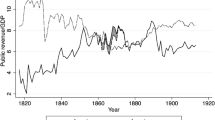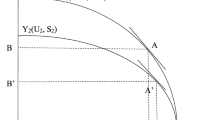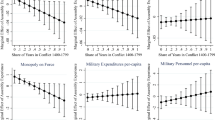Abstract
The relationship between war and state formation is a central topic in the social sciences. While scholarship on interstate war posits that conflict triggers extractive processes that build the state, research findings on the effects of intrastate war are more mixed, often suggesting that civil war inhibits extraction and induces state decay. This study, however, posits that the negative relationship between civil war and revenue extraction is not underpinned by institutional destruction but by the wartime introduction of undermining rules that structure behavior in ways that subvert taxation. To illustrate this claim, it traces the evolution of undermining rules within the customs administration at the height of the Guatemalan armed conflict. As the perceived escalation of the insurgent threat created institutional ambiguity, newly empowered political-military elites implemented alternative procedures for capturing customs revenues, which systematically undermined the state’s extractive capacity. Comparing this case with one of reinforcing rules that bolster extraction, I posit that the broad or narrow nature of the rule-making coalition explains divergent paths of wartime institutional development. Overall, this study uncovers the inner workings of the counterinsurgent state and illustrates how civil war dynamics induce processes of institutional change that can have long-term effects on state performance.


Similar content being viewed by others
Notes
This conceptualization echoes other scholarly contributions on the relationship between formal and informal institutions. Lauth (2000: 25) cites “conflicting” and “complementary” relationships, Similarly, Grzymala-Busse (2010: 321–4) points to “undermining” informal institutions, and informal institutions that “support or reinforce” formal institutions. Within the statebuilding literature, this conceptualization also follows Hui’s (2005) distinction between states’ self-“strengthening” and “weakening” logics.
This logic draws on theoretical insights from Yashar (1997) that the concentration of power in unified elites is less likely to produce democratic outcomes, as opposed to contexts with a divided elite.
This intelligence outfit was first known as the Regional Telecommunications Center or “La Regional,” but I will use its more common name, “El Archivo.”
See Scharpf (2018) on the role of officer ideology in repression.
References
Acemoglu D, Fergusson L, Robinson JA, Romero D, Vargas JF. The perils of high-powered incentives: evidence from Colombia’s false positives. NBER Working Paper No. 22617; 2018.
Agamben G. Homo sacer: sovereign power and bare life. Stanford: Stanford University Press; 1998.
AHPN [Historical Archive of the National Police]. GT PN 30–01 S009, Oficio No. 201/83.-SEM. Dirección General, Director General, Expedientes de informes; 1983 [Reference No. 5114058].
AHPN [Historical Archive of the National Police]. GT PN 30–01 S009. Oficio No. 001-SEM-MEAM-84. Dirección General, Director General, Expedientes de informes; 1984 [Reference 5119396].
AHPN [Historical Archive of the National Police]. GT 50 S028. Oficio No. 07–86 UOP SEM. Departamento de Investigaciones Criminológicas, Expedientes de ministerios; 1986 [Reference 4248230].
Andreas P. Blue helmets and black markets: the business of survival in the siege of Sarajevo. Ithaca: Cornell University Press; 2008.
Arjona AM. Wartime institutions: a research agenda. J Confl Resolut. 2014;58:1360–89.
ASIES. Análisis de la Defraudación Aduanera y el Contrabando en Guatemala. Guatemala City; 2013.
ASIES. Fortalecimiento de la Recaudación Tributaria, Transparencia Aduanera y Reducción del Comercio Exterior Ilícito en Guatemala. Guatemala City; 2017.
Balcells L, Sullivan CM. New findings from conflict archives: an introduction and methodological framework. J Peace Res. 2018;55:137–46.
Barreto B. De Moreno a La Línea: la huella militar en la defraudación aduanera. Plaza Pública; 2015. Available at https://www.plazapublica.com.gt/content/de-moreno-la-linea-la-huella-militar-en-la-defraudacion-aduanera-0.
Bayart JF, Ellis S, Hibou B. The criminalization of the state in Africa. Oxford: J Currey; 1999.
Bennett A, Checkel JT. Process tracing: from metaphor to analytical tool. New York: Cambridge University Press; 2015.
Besley T, Persson P. Wars and state capacity. J Eur Econ Assoc. 2008;6:522–30.
Bräutigam DA, Fjelstad OH, Moore M (eds). Taxation and state-building in developing countries. New York: Cambridge University Press, 2008.
Bueno de Mesquita B, Smith A, Siverson RM, Morrow JD. The logic of political survival. Boston: MIT Press; 2003.
Cárdenas M, Eslava M, Ramírez S. Why internal conflict deteriorates state capacity? Evidence from Colombian municipalities. Documentos CEDE 2013.
CEH [Commission for Historical Clarification]. Guatemala: memory of silence, report of the Commission for Historical Clarification, conclusions and recommendations. Guatemala City: United Nations; 1999.
Centeno MA. Blood and debt: war and the nation-state in Latin America. Pennsylvania State University: University Park; 2002.
Ch R, Shapiro J, Steele A, Vargas JF. Endogenous taxation in ongoing internal conflict: the case of Colombia. American Political Science Review. 2018;112:996–1015.
CICIG, MP. La Línea: Máximos Beneficios,” Presentation Guatemala City; August 25, 2015.
Collier P. Doing well out of war. London: World Bank; 1999.
Collier P. Rebellion as quasi-criminal activity. J Confl Resolut. 2000;44:839–53.
Darden K. The integrity of corrupt states: graft as an informal state institution. Polit Soc. 2008;36:35–59.
Dirección de los Archivos de Paz. El Estado Mayor Presidencial en Guatemala: una aproximación. Guatemala City: Secretaría de la Paz; 2011.
Eaton K. The downside of decentralization: armed clientelism in Colombia. Secur Stud. 2006;15:553–62.
Eibl F, Hertog S, Slater D. War makes the regime: regional rebellions and political militarization worldwide. British Journal of Political Science 2019;First View; 1–22.
Falleti TG. Process tracing of extensive and intensive processes. New Political Economy. 2016;21:455–62.
Flores-Macías GA. Financing security through elite taxation: the case of Colombia’s “Democratic Security Taxes”. Stud Comp Int Dev. 2014;49:477–500.
Flores-Macías GA. The consequences of militarizing anti-drug efforts for state capacity in Latin America: evidence from Mexico. Comparative Politics. 2018;51:1–20.
González-Izás M. Territorio, actores armados y formación del estado. Guatemala City: Editorial Cara Parens; 2014.
Gracher, H. Elites and taxation: the case of Colombia’s Democratic Security Tax. In: PSA 66th Annual International Conference, Brighton, UK; 2016.
Gryzmala-Busse A. The best laid plans: the impact of informal rules on formal institutions in transitional regimes. Stud Comp Int Dev. 2010;45:311–33.
Helmke G, Levitsky S. Informal institutions and democracy: lessons from Latin America. Baltimore: Johns Hopkins University Press; 2006.
Herbst J. States and power in Africa. Princeton University Press: Princeton; 2000.
Hui V. War and state formation in ancient China and early modern Europe. New York: Cambridge University Press; 2005.
Kalyvas SN. The logic of violence in civil war. New York: Cambridge University Press; 2006.
Keen D. The economic functions of violence in civil war. Adelphi paper. New York: Oxford University Press for the International Institute of Strategic Studies; 1999.
Knight J. Institutions and social conflict. New York: Cambridge University Press; 1992.
La República. Clan del capo ‘Moreno,’ se desarticula. September 18, 1996: 3.
Lake DA. The statebuilder’s dilemma: on the limits of foreign intervention. Ithaca: Cornell University Press; 2016.
Lauth HJ. Informal institutions and democracy. Democratization. 2000;7:21–50.
Lieberman ES. Taxation data as indicators of state-society relations: possibilities and pitfalls in cross-national research. Stud Comp Int Dev. 2002;36:89–115.
Lu L, Thies CG. War, rivalry, and state building in the Middle East. Polit Res Q. 2013;66:239–53.
Lyall J. Process tracing, causal inference, and civil war. In: Bennett A, Checkel JT, editors. Process tracing: from metaphor to analytical tool. New York: Cambridge University Press; 2015. p. 186–208.
Mahoney J. Process tracing and historical explanation. Secur Stud. 2015;24:200–18.
Mahoney J, Thelen K. Explaining institutional change: ambiguity, agency, and power. New York: Cambridge University Press; 2010.
Mampilly ZC. The nexus of militarisation and corruption in post-conflict Sri Lanka. In: Zaum D, Cheng C, editors. Selling peace: post-conflict peacebuilding and corruption. New York: Routledge; 2011.
Nordstrom C. Shadows of war: violence, power, and international profiteering in the twenty-first century. Berkeley: University of California Press; 2004.
Organismo Judicial. Expediente 22023–2003-00048. Ortiz Arriaga testimony; May 25, 1999.
Organismo Judicial. Expediente 22023–2003-00048. De los Ríos testimony; May 26, 1999.
Organismo Judicial. Letter to “Bonanza, S.A., Armando Cabane;” December 22, 1991 [Internal record: 2437].
Peacock SC, Beltrán A. Poderes ocultos: grupos ilegales armados en la Guatemala postconflicto y las fuerzas detrás de ellos. Washington, DC: Washington Office on Latin America; 2003.
Rasler K, Thompson WR. War making and state making: governmental expenditures, tax revenues, and global war. American Political Science Review. 1985;79:491–507.
Reno W. Corruption and state politics in Sierra Leone. New York: Cambridge University Press; 1995.
Rettberg A. The private sector and peace in El Salvador, Guatemala, and Colombia. J Lat Am Stud. 2007;39:463–94.
Rodríguez-Franco D. Internal wars, taxation, and state building. Am Sociol Rev. 2016;81:190–213.
Sanchez O. Tax reform paralysis in post-conflict Guatemala. New Political Economy. 2009;14:101–31.
SAT [Superintendent of Tax Administration]. Informe Circunstanciado y Memoria de Labores. Guatemala City; 2016.
Scharpf A. Ideology and state terror: how officer beliefs shaped repression during Argentina’s Dirty War. J Peace Res. 2018;55:206–21.
Schirmer JG. The Guatemalan military project: a violence called democracy. Philadelphia: University of Pennsylvania Press; 1998.
Schlichte K. State formation and the economy of intra-state wars. In: Jung D, editor. Shadow globalization, ethnic conflicts, and new wars. London: Routledge; 2003. p. 27–44.
Schmitt C. Political theology: four chapters on the concept of sovereignty. Chicago: University of Chicago Press; 2005.
Schneider A. State-building and tax regimes in Central America. New York: Cambridge University Press; 2012.
Secretaría del Estado Mayor Presidencial. Doc. C.2.1.6.2–5-S001–0040; C.2.1.6.2–5-S001–0042. Guatemala City: Archivo General de Centroamérica; 1979-1982.
Secretaría del Estado Mayor Presidencial. Memoria de Labores. Doc. C.2.1.6.2–5-S042–0003. Guatemala City: Archivo General de Centroamérica; 1982a.
Secretaría del Estado Mayor Presidencial. Memoria de Labores. Doc. C.2.1.6.2–5-S042–0005. Guatemala City: Archivo General de Centroamérica; 1982b.
Secretaría del Estado Mayor Presidencial. Memoria de Labores. Doc. C.2.1.6.2–5-S042–0011. Guatemala City: Archivo General de Centroamérica; 1983a.
Secretaría del Estado Mayor Presidencial. Doc. C.2.1.6.2–5-S001–0049. Guatemala City: Archivo General de Centroamérica; 1983b.
Secretaría del Estado Mayor Presidencial. Doc. C.2.1.6.2.-5-S005–0013. Guatemala City: Archivo General de Centroamérica; 1984.
Siglo Veintiuno. Capturan a presunto capo máximo de Aduanas. September 15, 1996: 3.
Sisk T. Statebuilding. Cambridge: Polity; 2013.
Slater D. Ordering power: contentious politics and authoritarian leviathans in Southeast Asia. New York: Cambridge University Press; 2010.
Soifer H. State building in Latin America. New York: Cambridge University Press; 2015.
Stanley W. The protection racket state: elite politics, military extortion, and civil war in El Salvador. Philadelphia: Temple University Press; 1996.
Streeck W, Thelen K. Beyond continuity: institutional change in advanced political economies. New York: Oxford University Press; 2005.
Thies CG. Of rulers, rebels, and revenue: state capacity, civil war onset, and primary commodities. J Peace Res. 2010;47:321–31.
Thies CG. Public violence and state-building in Central America. Comparative Political Studies. 2006;39:1263–82.
Thies CG. War, rivalry, and state building in Latin America. Am J Polit Sci. 2005;49:451–65.
Tilly C. Formation of national states in Western Europe. Princeton University Press: Princeton; 1975.
Tilly C. War making and state making as organized crime. In: Rueschemeyer D, Evans P, Skocpol T, editors. Bringing the state back in. New York: Cambridge University Press; 1985. p. 169–91.
US Department of Defense. Why the ‘Tanda’ Phenomenon Does Not Exist in the Guatemala Military. ProQuest Digital National Security Archive; August 27, 1991.
Yashar D. Demanding democracy: reform and reaction in Costa Rica and Guatemala, 1870s–1950s. Stanford, CA: Stanford University Press; 1997.
Author information
Authors and Affiliations
Corresponding author
Additional information
Publisher’s Note
Springer Nature remains neutral with regard to jurisdictional claims in published maps and institutional affiliations.
Rights and permissions
About this article
Cite this article
Schwartz, R.A. Civil War, Institutional Change, and the Criminalization of the State: Evidence from Guatemala. St Comp Int Dev 55, 381–401 (2020). https://doi.org/10.1007/s12116-020-09312-7
Published:
Issue Date:
DOI: https://doi.org/10.1007/s12116-020-09312-7




